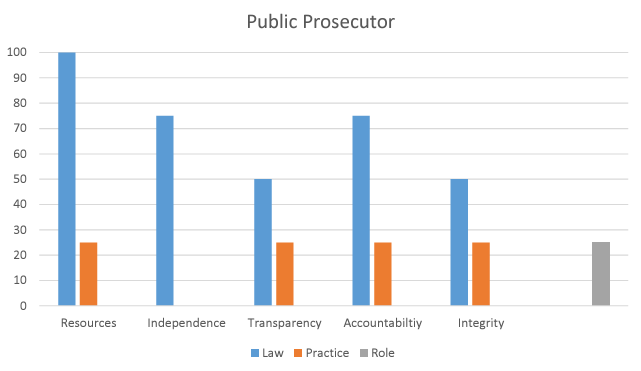At the beginning of 2024, Transparency International-Macedonia published the report: “National Integrity System of North Macedonia”, prepared within the project “EU4 Rule of Law: Citizen Engagement for Public Integrity (CEPI) in the Western Balkans and Turkey”, funded by the European Union and the Government of Switzerland. The National Integrity System contains 15 pillars that include the main institutions that are part of the anti-corruption system.
The Public Prosecutor is the pillar with the lowest score within the National Integrity System with overall score 38.9.
The capacity score (50) consists of score for the resources and the independence of institution.
The public prosecutor’s office (PPO) is the core institution in the criminal justice system in the Republic of North Macedonia. The legal framework provides appropriate salaries. However, there are significant resource gaps in the prosecution, with the budget not meeting the legally required minimum percentage. There is also a shortage of human resources, with many positions remaining unfilled.
There are comprehensive laws to ensure the independence of the prosecution. However, the public prosecutor is appointed by the Assembly, potentially subjecting that person to political influence. The prosecutorial council is an independent body to appoint and dismiss public prosecutors. In practice, prosecutors are often removed from their positions before their term ends, and appointments are criticised for non-transparent and under political influence.
In the governance part (41.7) are analyzed transparency, accountability and integrity.
The legal framework for the governance mechanisms needs improvement. The law and the code of ethics for public prosecutors, in combination with the Law for the Prevention of Corruption, provide mechanisms to ensure integrity. However, they do not cover hospitality or reimbursements for privately sponsored trips, and the ethics council’s activities are not transparent or well-documented.
The role (25) includes the corruption prosecution.
Prosecutorial achievements in corruption cases are limited, and convictions in high profile corruption cases are rare. Corruption cases often face a statute of limitations due to lengthy legal processes. There are ongoing investigations and prosecutions related to corruption, but very few high-value assets were confiscated.
Pillar Recommendations:
- The BPPOOCC and the SCPC need to establish everyday communication and cooperation on corruption related offences by signing a memorandum.
- The government needs to provide financial resources for additional human resources to the public prosecutor’s office and investigative centres in charge of investigating corruption.
- The chief prosecutor of the BPPOOCC needs to regularly report to the Assembly on the implementation of accountability mechanisms, such as disciplinary cases, citizen complaints and dismissals due to the violation of official duties.
- An independent disciplinary commission needs to be established to create an independent body to investigate complaints against public prosecutors and to ensure accountability.
- The government needs adopt regulatory provisions to protect a person who files a complaint against a public prosecutor.
- The public prosecutor’s office needs to provide a protected reporting channel for whistleblowers based on the Law on the Protection of Whistleblowers.
- The public prosecutor’s office should create a separate ethical committee that will ensure that citizen can make complaints about public prosecutors’ conduct in private, especially regarding their contacts, hospitality or interests.
This video is produced within the framework of the project: EU4 Rule of Law: Citizen Engagement for Public Integrity (CEPI) in the Western Balkans and Turkey, implemented by Transparency International-Macedonia and supported by the European Union and the Government of Switzerland.





